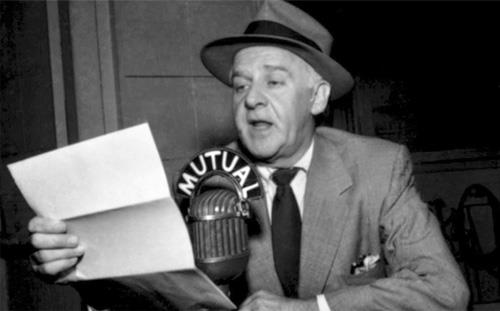
Walter Winchell was considered the second most famous man in America in the 1930s, after President Franklin D. Roosevelt.
We still remember FDR today. Winchell? Well, his influence has outlasted his name.
PBS explains both the man and the influence in a new American Masters, titled Walter Winchell: The Power of Gossip and airing Tuesday at 9 p.m. ET (check local listings).
Winchell took what could loosely be called a newspaper gossip column and parlayed it into a socio-political platform built on the unspoken premise that celebrity may matter more than substance.
That is, being famous gets more attention and therefore may generate more power and influence than actually doing something. It's a concept that resonates more strongly than ever in today's age of social media.
This American Masters, put together by Ben Loeterman, marches through Winchell's life at a rapid clip, with less outside commentary than video biographies often contain.
Within Winchell's career itself, it lingers on three specific dramas: Winchell's stark warnings about Adolf Hitler in the 1930s, his feud with Josephine Baker in the early 1950s, and his support of Sen. Joe McCarthy during McCarthy's anti-communist campaign over the next couple of years.
The three are connected.
As Winchell gained power and influence in the 1930s, through his reporting on the lives and doings of celebrities in popular culture, he expanded that mission also to echo Roosevelt's warnings that Hitler's ambitions were not limited to conquering a few countries in Europe. He wanted to spread his poison around the globe, and America had a duty to help stop him.
With isolationist sentiments running high in the 1930s, that was not always a popular position. After Pearl Harbor, Winchell was suddenly on the right side.
However, after the war, with no Hitler to warn against and Roosevelt dead, Winchell became a man without a core cause.
His feud with Baker began one night in 1951 when Baker and her party went into New York's Stork Club, Winchell's home base, and were declined service because they were black. Baker criticized Winchell, who had always portrayed himself as a foe of discrimination, for not standing up for her when his own favorite institution was involved.
Winchell fought back, as was his habit, by making it personal. Among other things, he accused Baker of having consorted with communists in the 1930s.
Like many other targets of the anti-communists, Baker suffered serious career damage, eventually moving back to France.
Meanwhile, Winchell, saw that the communist accusations worked and hitched his star to McCarthy – the face of the campaign to root all the commies out.
After McCarthy was disgraced, Winchell began to crumble as well. Winchell's newspaper went out of business in the early 1960s, he lost his TV and radio programs, and by the time he died in 1972, he was already almost forgotten.
But the key to his popularity, the idea that discussion of serious issues could be packaged the same way as the discussion of popular entertainment, is cited here as the foundational premise for current media personalities from Rachel Maddow to Sean Hannity.
Not to mention President Donald Trump.
Winchell himself, the son of impoverished and plucky immigrants, began his vaudeville career as a teenage performer. His first writings were a kind of an in-house newsletter for people in the business, detailing harmless back-fence chat like who was taking vacations where or who had auditioned for new gigs.
He noted that people really liked to read that stuff and expanded the idea to a column in the Evening Graphic, a sensationalist New York tabloid of the 1920s. Others did something similar, but no one dove into it like Winchell. He worked seven days a week, tirelessly making the rounds and getting to know the star, who benefited from making him their friend.
In his personal life, he and his companion (they never actually married), June, lost an adopted daughter to a heart defect when she was nine years old. American Masters says Winchell never got over that death, though it makes the assertion almost in passing.
Winchell and June had two other children, both of whom he neglected, and both of whose lives took unhappy paths. June eventually moved to Arizona without him.
Like many of today's media personalities, Winchell made himself famous by chronicling and often editorializing on the fame of others. While it doesn't sound like he had a terribly satisfying life beyond that, it also sounds like maybe he understood the tradeoff and accepted it.
He didn't influence history quite as much as Franklin Delano Roosevelt. But we see some of his legacies every day.